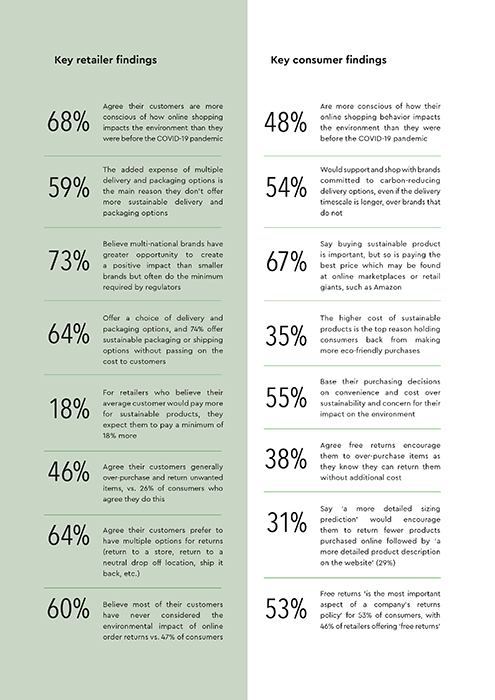New PFS research finds that cost and convenience is stifling consumers desire to shop sustainably.
ALLEN, Texas – Consumers in the US and UK desire to shop more sustainably, but poor customer experiences and higher prices are stifling them, new research from premier fulfilment provider, PFS, has found. Just under half (48%) of consumers in the US and UK are now more conscious of how their online shopping behavior impacts the environment than they were before the COVID-19 pandemic. But this heightened awareness is not necessarily translating into buying habits or being met by retailers, as consumers crave speed and convenience.
The survey, commissioned by PFS and conducted by Arlington Research, compared the expectations of 4,000 adult consumers and 200 senior decision-makers from the retail industry, when it comes to sustainable practices and returns processes. The results form part of PFS’ new report “Expectation vs. reality: is sustainability sustainable?” When questioned on these topics, over half of consumers (57%) agreed that if a brand has outstanding sustainability credentials but fails to meet their delivery and customer service expectations, they will not purchase from the same brand in the future. Meanwhile, for workers in the retail sector, the response rose dramatically – 76% of retailers believe this to be true of their customers.
Despite the importance of sustainability in the purchase process, it seems that cost is still a priority that can trump the ethical aspirations of consumers. The top reason holding them back from making more eco-friendly purchases is the higher cost of sustainable products (35%). Retailers also agreed with this as the top reason (47%). In fact, over half of consumers (55%) agreed they base their purchasing decisions on convenience and cost over sustainability and concern for their impact on the environment. Speed also plays a big factor, with just over half those surveyed (51%) agreeing that fast delivery is the most important consideration for them when buying a product online.
Patrick Lowe, AVP Business Management at PFS, said, “Retailers understand that consumers have heightened awareness levels when it comes to the impact of how they shop but also that their ideals don’t always match the realities. It’s a balancing act to appeal to cost-conscious consumers with cost-effective and sustainable solutions from retailers. Consumers know what they want to do but aren’t actively doing it yet. Perhaps they need to see more tangible evidence or be given more lucrative options that meet their needs of speed and environmental consciousness?”
“It is important that the retail industry – along with other influencers in the supply chain – take steps to drive and support behaviors that consumers want to demonstrate. Retailers need to work with consumers to make sustainability sustainable and incentivize them to want and choose more sustainable options. Changes don’t need to be widespread or wholescale, but by offering different choices, retailers can start to support shoppers and build loyalty,” Lowe adds.
To remove the complexity and cost for retailers, working with a third-party logistics provider can take the strain out of sustainability and lead to improved ROI and enhanced reputation, so retailers can stand ahead of the pack.
For more research findings and to gain further insights and recommendations for retailers, download the full report here.

Research methodology
PFS commissioned research agency, Arlington Research, to survey 4,000 adults about their expectations from brands when it comes to sustainable practices and returns processes. Nationally representative interviews were carried out with adults aged 18+ with quotas set on age, gender, and region at a country-wide level. Respondents came from the UK (2,000) and the US (2,000).
To compare attitudes and expectations of consumers with actions and aspirations of brands, 200 interviews were conducted with those working for retailers or consumer brands selling direct to consumers online or via online marketplaces. Annual sales revenues of these businesses were more than $15 million (or over £10.5 million). Respondents were director level or above working in customer experience, customer service, eCommerce, operations, supply chain or C-suite roles.
About PFS
PFS is the premier eCommerce order fulfilment provider. We facilitate each operational step of an eCommerce order in support of DTC and B2B retail brands and specialize in health & beauty, fashion & apparel, jewelry, and consumer packaged goods. Our scalable solutions support customized pick/pack/ship services that deliver on brand ethos with each order. A proven order management platform, as well as high-touch customer care reinforce our operation. With 20+ years as an industry leader, PFS is the BPO of choice for brand-centric omnichannel operations. For more information, visit www.pfscommerce.com.
About PFSweb, Inc.
PFSweb (NASDAQ: PFSW) is a global commerce services company that manages the online customer shopping experience on behalf of major branded manufacturers and retailers. Across two business units – LiveArea for data-driven marketing and omnichannel experience design through technology selection, platform implementation and orchestrated services, and PFS for order fulfilment, contact center, payment processing/fraud management, and order management services – they provide solutions to a broad range of Fortune 500® companies and household brand names such as Procter & Gamble, L’Oréal USA, Champion, Pandora, Ralph Lauren, Shiseido Americas, the United States Mint, and many more. PFSweb enables these brands to provide a more convenient and brand-centric online shopping experience through both traditional and online business channels. The company is headquartered in Allen, TX with additional locations around the globe. For more information, visit www.pfsweb.com.
Scott Ellyson, CEO of East West Manufacturing, brings decades of global manufacturing and supply chain leadership to the conversation. In this episode, he shares practical insights on scaling operations, navigating complexity, and building resilient manufacturing networks in an increasingly connected world.